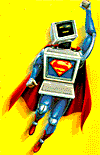2.7.1. No Drugs without Media, No Media without Drugs
As I already mentioned mediatheory is influenced by drug-theory. So it is no wonder that the relationship between the universal medium computer and the human becomes most often described as similar to a relationship drug - user. "The computer's holding power is a phenomenon frequently referred to in terms associated with drug addiction. It is striking that the word 'user' is associated mainly with computers and drugs." (Turkle 1997: 30) In fact the discourse about computer-user relationship becomes determined by this notion. 'Computers make addictive' is a wide-spread notion, especially when the computer gets online and becomes a medium with unlimited borders. And so there are already in analogy to the anonymous alcoholics the first selfhelpgroups for online-addicts 'The anonymous online-addicts'. Paradoxically this group meets online.
But to see drugs only as something addictive misses out a lot and discredits the whole concept of drug. Sherry Turkle prefers therefore another metaphor: "I prefer the metaphor of seduction because it emphasizes the relationship between person and machine. Love, passion, infatuation, what we feel for another person teaches us about ourselves. If we explore these feelings, we can learn what we are drawn to, what we are missing, and what we need. The analysis of computational seductions offers similar promise if we drop the cliché of addiction and turn to the forces, or more precisely, the diversity of forces that keep us engrossed in computational media."(ibid.: 30) For Sherry Turkle the notion of addiction wipes out all other attributes of drugs. And she is right many prejudices and wrong imaginations make it difficult to deal with the concept drug.
However it is the main analogy used, when mediatheorists and science fiction authors talk of the relationship between user and computer. In Understanding Media (1965) Marshall McLuhan compares media with drugs and describes their effects as narcotic ('narcism and narcosis'). A similar notion one can find in Neil Postman's work. Timothy Leary speaks in Chaos and Cyberculture (1994) of cybernetics in analogy to psychedelics. Computernetworks become therefore a kind of an hallucinogenic electronic drug. The same does Douglas Rushkoff in Cyberia (1994) as already seen in chapter about Cyberia. This is also a very common notion of science fiction authors like William Gibson in Neuromancer (1984): Cyberspace as "consensual hallucination experienced daily by billions of legitimate operators, in every nation, by children being taught mathematical concepts... A graphic representation of data abstracted from the bank of every computer in the human system." (Gibson quoted by Featherstone; Burrows1995: 6) Neal Stephenson in Snow Crash (1992) describes drugdealers in the metaverse dealing with 'snow crash', binary bits of information, which have the effect of drugs. Paul Virilio speaks of 'de-realisation' and the substitution of reality through virtual reality' and states that "The suggestive power of virtual technologies is without parallel. Next to the illicit drugs-based narco capitalism which is currently destabilizing the world economy, a computer-communication narco-economy is building up fast." (WWW: Speed and Information: 4) Jean Baudrillard and Arthur Kroker share the notion of the 'ecstasy of communication'. Michael Heim speaks of virtual reality as "virtual environment [that] sucks in its users with a power unlike any other medium unless we include under media the religious rituals and sacred dramas that once gave art works their context." (Heim 1995: 68)
 It is a widely used analogy to compare drugs or drug rituals and
computers and its usage and so finally computer and drug become
perceived as the same. Agentur Bilwet therefore suggests to conceptualize
media as drugs and drugs as media: "Drugs are means of transport
to the place where you already are: They make the invisible visible:
that what you star at all day." (Bilwet 1994:195- transl. S.J.)
They describe 'drugs as media', "Plant-drugs are teleports who
offer access to parallel worlds." (Agentur Bilwet 1993: 98 - transl.
S.J.), 'media as drugs': "When a new medium is introduced, a hallucinogenic
effect appears. Think of the first bicycle-tour with a walkman
or the first contact with Cyberspace." (ibid.:100- transl. S.J.)
and 'media and drugs': "Drugs and media are equal partners. As
long as the computer is not directly connected to the brain (and
therefore to the process of creation), retarding and accelerating
drugs are necessary to keep cool in the midst of the incredible
data-interaction, that are the basis for virtual realities. Drugs
can be used as meta-media, to dominate the technical media.[..]
But at the same time they make technical media out of ones own
nerves." (ibid.: 102- transl. S.J.)
It is a widely used analogy to compare drugs or drug rituals and
computers and its usage and so finally computer and drug become
perceived as the same. Agentur Bilwet therefore suggests to conceptualize
media as drugs and drugs as media: "Drugs are means of transport
to the place where you already are: They make the invisible visible:
that what you star at all day." (Bilwet 1994:195- transl. S.J.)
They describe 'drugs as media', "Plant-drugs are teleports who
offer access to parallel worlds." (Agentur Bilwet 1993: 98 - transl.
S.J.), 'media as drugs': "When a new medium is introduced, a hallucinogenic
effect appears. Think of the first bicycle-tour with a walkman
or the first contact with Cyberspace." (ibid.:100- transl. S.J.)
and 'media and drugs': "Drugs and media are equal partners. As
long as the computer is not directly connected to the brain (and
therefore to the process of creation), retarding and accelerating
drugs are necessary to keep cool in the midst of the incredible
data-interaction, that are the basis for virtual realities. Drugs
can be used as meta-media, to dominate the technical media.[..]
But at the same time they make technical media out of ones own
nerves." (ibid.: 102- transl. S.J.)
 When media are drugs, the use of computers must have similar effects
than taking drugs. Certain drugs disrupt the concept of time and
space, just like cyberspace does. Besides their notion of addiction
or seduction certain drugs also empower in producing behavior
which is not possible without the use of the drug, by enhancing
creativity, physical power etc.. And the same is true for the
electronic drug where the web of interconnected computers provide
the ultimate electronic neural extension for the growing mind.(Rushkoff)
The notion of empowerment goes along with McLuhan's notions that
media are extensions of the senses, the mind and the body. An
often described effect of drugs is also the one of disembodiment,
which can be seen analogous to the creation of a terminal identity,
a digital narrative freed from reality so that it can become a
virtual identity.
When media are drugs, the use of computers must have similar effects
than taking drugs. Certain drugs disrupt the concept of time and
space, just like cyberspace does. Besides their notion of addiction
or seduction certain drugs also empower in producing behavior
which is not possible without the use of the drug, by enhancing
creativity, physical power etc.. And the same is true for the
electronic drug where the web of interconnected computers provide
the ultimate electronic neural extension for the growing mind.(Rushkoff)
The notion of empowerment goes along with McLuhan's notions that
media are extensions of the senses, the mind and the body. An
often described effect of drugs is also the one of disembodiment,
which can be seen analogous to the creation of a terminal identity,
a digital narrative freed from reality so that it can become a
virtual identity.
![]()